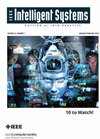- 充值
- 帮助

IEEE Intelligent Systems serves users, managers, developers, researchers, and purchasers who are interested in intelligent systems and artificial intelligence, with particular emphasis on applications. Typically they are degreed professionals, with backgrounds in engineering, hard science, or business. The publication emphasizes current practice and experience, together with promising new ideas that are likely to be used in the near future. Sample topic areas for feature articles include knowledge-based systems, intelligent software agents, natural-language processing, technologies for knowledge management, machine learning, data mining, adaptive and intelligent robotics, knowledge-intensive processing on the Web, and social issues relevant to intelligent systems. Also encouraged are application features, covering practice at one or more companies or laboratories; full-length product stories (which require refereeing by at least three reviewers); tutorials; surveys; and case studies. Often issues are theme-based and collect articles around a contemporary topic under the auspices of a Guest Editor working with the EIC.
- 主办单位: IEEE COMPUTER SOC
- 出版地区: United States
- 出版周期: 双月刊
- 国际标准连续出版物号: ISSN 1541-1672
- 创刊时间: 1986年
- 曾用名: IEEE intelligent systems & their applications
-
vol.39 (2024)
vol.39 (2024)
4.0 2.0 06 05 04 03 02 01 -
vol.39 (2023)
vol.39 (2023)
-
vol.38 (2023)
vol.38 (2023)
-
vol.37 (2022)
vol.37 (2022)
-
vol.36 (2021)
vol.36 (2021)
-
vol.PP (2020)
vol.PP (2020)
-
vol.35 (2020)
vol.35 (2020)
-
vol.34 (2019)
vol.34 (2019)
-
vol.33 (2018)
vol.33 (2018)
-
vol.32 (2017)
vol.32 (2017)
-
vol.31 (2016)
vol.31 (2016)
-
vol.30 (2015)
vol.30 (2015)
-
vol.29 (2014)
vol.29 (2014)
-
vol.28 (2013)
vol.28 (2013)
-
vol.27 (2012)
vol.27 (2012)
-
vol.26 (2011)
vol.26 (2011)
-
vol.2010 (2010)
vol.2010 (2010)
-
vol.25 (2010)
vol.25 (2010)
-
vol.24 (2009)
vol.24 (2009)
-
vol.23 (2008)
vol.23 (2008)
-
vol.22 (2007)
vol.22 (2007)
-
vol.21 (2006)
vol.21 (2006)
-
vol.20 (2005)
vol.20 (2005)
-
vol.19 (2004)
vol.19 (2004)
-
vol.18 (2003)
vol.18 (2003)
-
vol.17 (2002)
vol.17 (2002)
-
vol.16 (2001)
vol.16 (2001)
-
vol.15 (2000)
vol.15 (2000)
-
vol.14 (1999)
vol.14 (1999)
-
vol.13 (1998)
vol.13 (1998)
-
vol.12 (1997)
vol.12 (1997)
-
vol.11 (1996)
vol.11 (1996)
-
vol.10 (1995)
vol.10 (1995)
-
vol.9 (1994)
vol.9 (1994)
-
vol.8 (1993)
vol.8 (1993)
-
vol.7 (1992)
vol.7 (1992)
-
vol.6 (1991)
vol.6 (1991)
-
vol.5 (1990)
vol.5 (1990)
-
vol.4 (1989)
vol.4 (1989)
-
vol.3 (1988)
vol.3 (1988)
-
vol.2 (1987)
vol.2 (1987)
-
vol.1 (1986)
vol.1 (1986)
- 1
- 2
- 3
- 4
- 5

 分析评价
分析评价
